
Review of Derivatives Research
Scope & Guideline
Exploring the Depths of Derivatives Innovation
Introduction
Aims and Scopes
- Theoretical Modeling of Derivatives:
The journal publishes research that develops and evaluates theoretical models for pricing and managing risk associated with derivatives, including options, futures, and swaps. - Empirical Analysis of Market Behavior:
Research often includes empirical investigations into market dynamics, volatility patterns, and pricing anomalies in derivative markets, providing insights into how derivatives behave in real-world scenarios. - Risk Management and Hedging Strategies:
The journal emphasizes studies that explore innovative risk management techniques and hedging strategies using derivatives, particularly in volatile and uncertain market environments. - Applications of Advanced Mathematical Techniques:
Contributions frequently apply advanced mathematical and statistical methods, including stochastic calculus and machine learning, to enhance pricing models and risk assessment frameworks. - Interdisciplinary Approaches:
The journal supports interdisciplinary research that integrates concepts from finance, economics, and quantitative methods to address complex issues in derivative research.
Trending and Emerging
- Cryptocurrency Derivatives:
The increasing focus on cryptocurrency options and derivatives showcases the growing importance of digital assets in the financial landscape and the need for innovative pricing and risk management solutions. - Stochastic Volatility Models:
There is a rising trend towards the use of stochastic volatility models in derivative pricing, reflecting a deeper understanding of market behaviors and the need for more sophisticated modeling techniques. - Liquidity Risk in Derivatives:
Research addressing liquidity risk in various derivative contexts is gaining traction, highlighting the significance of liquidity as a critical factor influencing pricing and trading strategies. - Machine Learning Applications:
The application of machine learning techniques in derivative research is on the rise, indicating a shift towards data-driven methodologies that enhance predictive capabilities and model accuracy. - Behavioral Finance Perspectives:
Emerging studies incorporating behavioral finance into derivative pricing and market analysis suggest a growing recognition of psychological factors influencing trader behavior and market outcomes.
Declining or Waning
- Traditional Option Pricing Models:
There appears to be a declining focus on traditional option pricing models, as newer methodologies and models are gaining traction, possibly due to the limitations of classical approaches in capturing market complexities. - Static Hedging Techniques:
Research centered around static hedging techniques is becoming less frequent, as practitioners and researchers pivot towards more dynamic and adaptive hedging strategies that respond to market movements. - Basic Derivative Instruments:
There is a noticeable reduction in studies focusing solely on basic derivative instruments, such as vanilla options, as the journal shifts towards more complex derivatives and innovative risk management tools. - Historical Analysis of Derivatives Markets:
The exploration of historical data and trends in derivatives markets is waning, possibly indicating a preference for contemporary issues and real-time analytics in derivative research.
Similar Journals
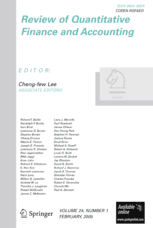
Review of Quantitative Finance and Accounting
Empowering Research with Quantitative PrecisionThe Review of Quantitative Finance and Accounting, published by Springer, is a distinguished academic journal that has been at the forefront of scholarly discourse since its inception in 1991. With an ISSN of 0924-865X and an E-ISSN of 1573-7179, this journal specializes in the interdisciplinary realms of accounting and finance, particularly emphasizing quantitative methodologies and their applications in real-world scenarios. With an impressive track record reflected in its 2023 rankings, it sits in the Q2 category across key fields such as Accounting, Business Management, and Finance, demonstrating its relevance and influence within these domains. Although it operates without an Open Access option, the journal's content remains vital for researchers, professionals, and students aiming to deepen their understanding of quantitative approaches in finance and accounting contexts. The Review of Quantitative Finance and Accounting stands as an essential resource for advancing knowledge and fostering innovation within these critical disciplines.
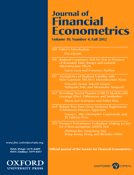
Journal of Financial Econometrics
Unveiling the complexities of financial markets through rigorous analysis.Journal of Financial Econometrics, published by Oxford University Press, stands as a leading academic journal in the fields of financial economics and econometrics. With an impressive impact factor and a ranking in the Q1 quartile for both Economics and Finance categories in 2023, this journal is recognized for its contribution to advancing theoretical and applied methodologies in financial econometric analysis. It publishes high-quality research that addresses critical issues in finance, aiming to foster a deeper understanding of the economic factors influencing financial markets and instruments. Researchers and practitioners alike benefit from its rigorous peer-reviewed articles, which are invaluable resources for both academic scholars and finance professionals. The journal’s content typically spans pioneering techniques in econometric modeling, empirical analysis of financial instruments, and innovative applications of econometric theory in real-world scenarios. Operating out of the United Kingdom, the journal continues to serve as a vital platform for disseminating significant research findings from 2005 to 2024, ensuring that the latest advancements in the field are accessible to its audience.

Decisions in Economics and Finance
Bridging Theory and Practice in FinanceDecisions in Economics and Finance, published by SPRINGER INT PUBL AG, is a leading journal in the fields of economics, econometrics, and finance, providing a critical platform for researchers, professionals, and students to disseminate their findings and insights. With an impressive impact factor positioned in the Q2 category for both Economics and Finance in 2023, this journal is recognized for its rigorous peer-reviewed process and impactful research contributions. The journal spans over areas of general economics and finance, emphasized by its Scopus rankings, which place it in the 68th and 50th percentiles respectively. Since its inception in 1997 and continuing through its conferred years, Decisions in Economics and Finance continues to foster innovative approaches to economic and financial decision-making while bridging theoretical and practical applications. While it currently does not offer Open Access options, its commitment to quality research and interdisciplinary collaboration makes it a vital resource for anyone engaged in these dynamic fields.
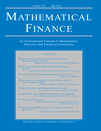
MATHEMATICAL FINANCE
Elevating Standards in Financial AcademiaMATHEMATICAL FINANCE is a prestigious journal published by Wiley, focusing on the interdisciplinary fields of finance, applied mathematics, accounting, and economics. With its ISSN 0960-1627 and E-ISSN 1467-9965, this journal has earned its place in the top tier of academic publications, reflected by its Q1 rankings across multiple categories in 2023, including Accounting, Applied Mathematics, Economics and Econometrics, Finance, and Social Sciences. MATHEMATICAL FINANCE, which commenced publishing in 1991, is recognized for its rigorous peer-review process and its significant contribution to the advancement of knowledge in quantitative finance methodologies and risk management practices. Although it does not currently offer open access, the journal remains an invaluable resource for researchers, professionals, and students seeking to stay abreast of the latest theoretical advancements and empirical studies in mathematical finance. Its impact factor and Scopus rankings further illustrate its high standing within the academic community, making it an essential platform for impactful research and scholarly discourse.
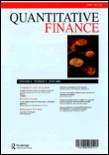
QUANTITATIVE FINANCE
Empowering research excellence in quantitative methods.QUANTITATIVE FINANCE, published by Routledge Journals, Taylor & Francis Ltd, stands at the forefront of academic research in the dynamic fields of finance, economics, and econometrics. With a strong commitment to disseminating cutting-edge research, this esteemed journal, which has been published since 2001 and continues to thrive with an anticipated convergence until 2024, occupies a prestigious Q1 ranking in Economics, Econometrics, and Finance and a Q2 ranking in Finance as of 2023. It serves as an essential platform for interdisciplinary studies, aiming to bridge theoretical approaches and practical applications in quantitative methods. Researchers, professionals, and students are provided access to a wealth of high-quality articles that contribute to the ongoing discourse and advancements in these fields. As the journal continues to impact its community, QUANTITATIVE FINANCE remains an invaluable resource for those seeking to stay at the cutting edge of financial research and its applications globally.
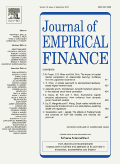
Journal of Empirical Finance
Connecting theory and practice in empirical finance.Journal of Empirical Finance, published by Elsevier, stands as a key resource in the areas of finance and economics, with a definitive focus on empirical studies. As a prominent journal since its inception in 1993, it has made significant strides in contributing to the academic community, evidenced by its soaring categorization in Q1 for Finance and Q2 for Economics and Econometrics as of 2023. With an ISSN of 0927-5398 and an E-ISSN of 1879-1727, the journal emphasizes robust, data-driven analysis to inform both theoretical and practical aspects of financial research. While access options do not include open access, the journal ensures that its content remains accessible to a diverse audience of researchers, professionals, and students. It fosters a platform for innovative research and discourse, significantly impacting the fields of finance, economics, and econometrics. The Scopus rankings further bolster its reputation, placing it in the 61st percentile in both categories, reflecting a commitment to high-quality research output. As the journal continues to evolve, it invites contributions that push the boundaries of empirical finance, enabling a deeper understanding of financial mechanisms that drive global economies.
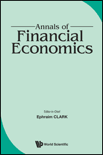
Annals of Financial Economics
Cultivating High-Impact Research for Tomorrow's EconomistsAnnals of Financial Economics, published by World Scientific Publishing Co. Pte Ltd, is a premier scholarly journal catering to the fields of finance, economics, and international management. With an impressive impact factor and categorized in the Q2 quartile across multiple disciplines in the 2023 rankings, the journal holds a prominent position among its peers, evidenced by its ranking in the top 15% for Economics and Econometrics and Finance categories. The journal aims to foster high-quality, innovative research that addresses contemporary financial issues, making it a vital resource for researchers, professionals, and students alike. Although it does not operate under an open access model, it ensures that its contributions advance scientific discourse and provide valuable insights into financial theories, practices, and policies. With a historical publication span from 2005 to 2009 and again from 2011 to 2024, the Annals remains a critical platform for disseminating transformative ideas in financial economics, ensuring its relevance in a rapidly evolving scholarly landscape.
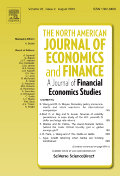
North American Journal of Economics and Finance
Pioneering research for a dynamic economic landscape.The North American Journal of Economics and Finance is a premier academic journal published by Elsevier Science Inc. since 1992, dedicated to advancing the field of economics and finance through rigorous research and scholarship. With an impressive impact factor and recognition in the Q2 category for Economics and Econometrics and Q1 for Finance as of 2023, this journal holds a significant position in the academic community, ranked #41 out of 317 in Finance and #100 out of 716 in Economics. The journal features high-quality, peer-reviewed articles that cover a broad range of topics, from theoretical frameworks to empirical analyses and practical applications. Though not an open-access platform, the journal provides valuable insights for researchers, practitioners, and students alike, promoting knowledge dissemination in the dynamic landscape of economic and financial studies. With its commitment to excellence, the North American Journal of Economics and Finance serves as an essential resource for those seeking to deepen their understanding of contemporary issues in these critical fields.
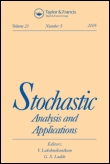
STOCHASTIC ANALYSIS AND APPLICATIONS
Transforming uncertainty into opportunity with stochastic research.STOCHASTIC ANALYSIS AND APPLICATIONS is a prestigious peer-reviewed journal published by Taylor & Francis Inc, dedicated to advancing the field of stochastic processes and their applications across various disciplines. With an ISSN of 0736-2994 and an E-ISSN of 1532-9356, this journal has established itself as a vital resource for researchers and practitioners, offering high-quality articles that address both theoretical and practical aspects of stochastic analysis. As of 2023, the journal holds a commendable Q2 rank in the fields of Applied Mathematics, Statistics and Probability, and Statistics, Probability and Uncertainty, reflecting its significant impact in these domains. The journal is indexed in Scopus and ranks in the top percentiles for its categories, making it an essential read for scholars interested in the latest developments in stochastic methods and their real-world implications. Although it does not offer open access, the journal ensures that its contents are widely disseminated within academia, fostering knowledge that drives innovation and application in various sectors.
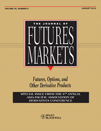
JOURNAL OF FUTURES MARKETS
Pioneering Research in Financial FuturesThe JOURNAL OF FUTURES MARKETS, published by WILEY, stands at the forefront of research in the fields of accounting, economics, finance, and business management. With an ISSN of 0270-7314 and E-ISSN 1096-9934, the journal has been a key academic resource since its inception in 1981, with content converging up to 2024. It is recognized for its rigorous peer-review process and maintains a strong presence in the academic community, holding a Q2 ranking in multiple categories such as accounting and finance, according to the latest 2023 evaluations. With a reputable Scopus ranking, where it ranks in the 65th percentile for economics and econometrics, this journal is essential reading for researchers, professionals, and students alike who seek to explore the complexities of future markets. While not an open-access publication, it offers various subscription options that make cutting-edge research accessible to a broad audience, fostering a deeper understanding of market dynamics and trends.